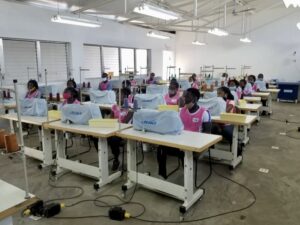Haitian Farmers Request Final Push to Receive Full Compensation
In 2018, we shared groundbreaking news that communities we support in Haiti had reached an historic agreement to remedy harm. We are in year five of implementing that agreement, and while significant progress has been made, critical gaps require more time and a concerted push to see this agreement over the finish line. We believe the IDB must extend monitoring of this agreement to ensure that every family receives the income-generating opportunities to which they are entitled and to ensure that the community’s environmental and social concerns are addressed.
Today, we are publishing an update to our implementation tracking website, showing both the significant gains and challenges still to be overcome to ensure that the agreement on paper leads to meaningful changes for the families who were harmed.

A popular training program to help the community access employment at the Park was
discontinued during the pandemic – people are still waiting for it to restart.
Twelve years ago, more than 420 Haitian farmers and their families–nearly 4,000 people total–lost their livelihoods overnight after being forcibly displaced from their land to build the Caracol Industrial Park in northeast Haiti. In 2017, we supported these farmers, who organized themselves into a collective known as the Kolektif Peyizan Viktim Tè Chabè, to file a complaint to the Inter-American Development Bank (IDB). A yearlong mediated dialogue process led to a historic agreement with the IDB and the Haitian government to restore the livelihoods of those displaced families.
The IDB and Haitian government have taken significant steps to deliver the promised remedies in the last year in particular, including the long-awaited transfer of replacement land to 28 of the most vulnerable families. Eighty-nine families have received motorpumps to help with irrigating their land. And 189 individuals received training and assets to start micro-enterprises.
But multiple crises in the country have worsened already fragile conditions in Haiti, which has led to this vulnerable community eating fewer and lower quality meals, being unable to send their children to school, and unable to afford medical care. Those who have received the benefits of the agreement have expressed having greater resilience and greater hope for the future. Those who haven’t feel left behind and are demanding that the IDB and Haitian government follow through on their promise to provide jobs at the Park; finish delivering land, equipment and business training; and, ensure that the Park cleans up its mess—heaps of trash piles and pollution of local water resources. These members of the Kolektif have been waiting four years to receive the remedy they were promised. They deserve swift action now.
“When we were using the land, we were able to provide ourselves with an income because the land allowed us to do that. After they took the land, they did not provide any ways to purchase new land. Now we lose the opportunity to get land. When they promised to give us land, I was 50 years old, now I am 55, I can’t do the same activities I used to do before. Now I don’t own land anymore.” – Farmer who was displaced by the project
The IDB recently committed an additional $65 million to the Park. This type of investment should not move forward unless the IDB and the Haitian government can demonstrate their responsibility to fully uphold their agreement to remedy past harm and prevent and mitigate future harm. Community members harmed by initial investments in the Park are still waiting for land, equipment, and business training. They are waiting for access to job training and employment at the Park. And they are still waiting for a proper waste management system and transparent water testing. The IDB has a responsibility to extend its monitoring mandate, which ends in December of 2023, until the agreement is fully achieved, and it must incorporate lessons from this process into future investments.
Throughout the complaint process the Kolektif Peyizan Viktim Tè Chabè had the support of Accountability Counsel, a global, non-profit organization that specializes in supporting community-led dispute resolution; ActionAid Haiti, the local affiliate of ActionAid, a global movement of people working together to further human rights and defeat poverty; and the strong local leadership of Action pour la Reforestation et la Défense de l’Environnement (AREDE), a Northeast Haitian organization working to protect the environment, and fighting social exclusion, poverty, and land grabs.

